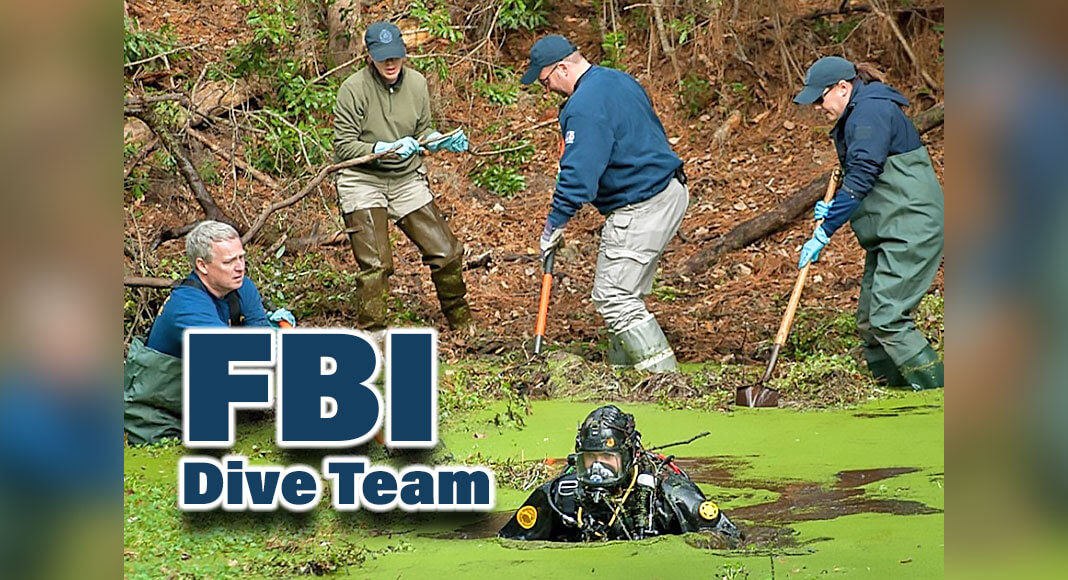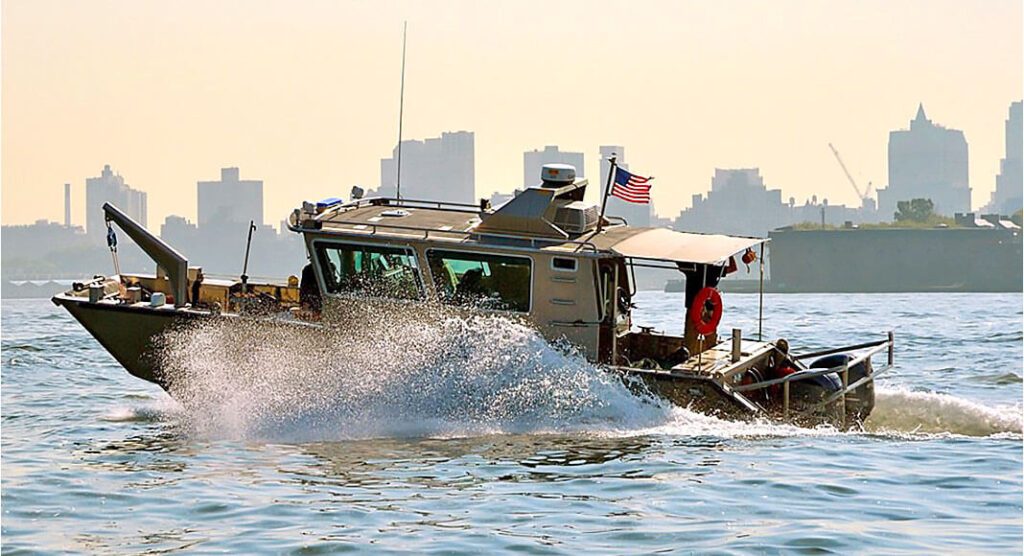
Texas Border Business
FBI – Daylight bounced off the surface of the Coosa River in Gadsden, Alabama, creating a soft luster over the relatively calm water. But below the surface, clouded with silt and mud, lay a secret that had been hidden for over 39 years.
In October 2022, a submerged vehicle was discovered in this section of the river—and local law enforcement believed this could be connected to an unsolved missing persons case.
They would need to examine the underwater scene, but the vehicle, a 1980 Ford Bronco, was filled with silt and mud up to the windshield. Any recovery would require an elite team of divers and underwater forensic specialists. Enter the FBI’s Underwater Search and Evidence Response Team (USERT).
FBI’s Dive Program
USERT comprises a group of highly trained FBI special agents tasked with searching for and recovering evidence underwater.
USERT grew out of the New York Field Office’s dive team, which was established in the 1980s. Initially, two agents who were recreational divers began finding weapons on their dives, many of which turned out to have connections to criminal cases. Word spread, and the requests for their special skillsets led to the creation of the New York Dive Team.

Today, USERT is part of the Evidence Response Team Unit (ERTU) within the FBI Laboratory. USERT divers are based out of the New York, Miami, Los Angeles, and Washington field offices and collaborate on cases across the country. With a total of 64 divers for the program, there are approximately 16 divers in each of the four field offices.
USERT members are not only expert divers—each one joined the FBI as an agent with a broad range of skillsets. Every agent can have a specialized collateral duty, in addition to their other responsibilities, which can take up to 25% of their time. USERT falls under this category, requiring tryouts to make the team and then rigorous training to prepare for the often grueling underwater work.
With USERT’s specialization, they get called in for the toughest underwater recovery cases.
As Supervisory Special Agent Brian Hudson, USERT program manager, explained: “We work on FBI cases and support local law enforcement—they’ll work the details of the case and collect the intelligence. Once they know something’s in the water, they’ll contact us to come out and search. We’ll recover the evidence, and based on chain of custody, we’ll give that evidence to the case agent or local law enforcement. They’ll send the items to a lab for further examination.”
Depending on the case, USERT may also work in international waters or assist fellow U.S. organizations. For instance, while the Coast Guard has their own maintenance divers, they do not have their own investigative dive team. In one case, USERT helped the Coast Guard recover large amounts of cocaine from a sunken drug running boat off the coast of Honduras. USERT has also been deployed to countries like Iraq to assist in investigations.
The Gadsden Dive and Aftermath
The challenge in the Gadsden case remained: how to remove the sediment from the submerged Ford Bronco so the team could search for evidence?
“A USERT forensics operational specialist created a suction dredge system in-house to help the team remove the mud,” said Hudson.
The windshield had already been knocked out, which let the dredge system pull the silt and mud out of the vehicle. Agents passed the mud through a screen to catch smaller pieces of potential evidence. Once the sediment was cleared, the divers could better conduct their search.
Ultimately, they found an almost complete skeleton. In addition, the divers found a wallet—still intact, along with a driver’s license, Goodyear ID, and social security card.
The identification documents matched those of Alan Livingston, who had been reported missing 39 years earlier. The skeletal remains— among the oldest underwater human remains the FBI has recovered—were sent to a lab for examination and a DNA test to confirm that they belonged to Livingston.
When Livingston went missing in 1983, the police didn’t have enough evidence to bring charges. The latest discoveries found in the Coosa River could change that—and finally bring closure to the case.
What does it take to join the FBI’s Underwater Search and Evidence Response Team (USERT)?
It’s certainly no easy feat—in addition to already being a special agent, USERT hopefuls must be certified divers and have exceptional physical and mental stamina. They must try out for the team and then complete rigorous basic training before embarking on a case.
Eligibility and Tryouts
Supervisory Special Agent Brian Hudson, USERT Program Manager, explained what it takes to qualify: “USERT is open to agents only. Once they are off probation, they are eligible to join. The main requirement is that you have a certification from an accredited diving organization, such as PADI (Professional Association of Diving Instructors) or SSI (Scuba Schools International). As long as you’re a certified diver and have completed at least 10 dives, then you can try out for the team.”
Tryouts are held once a year. Hudson said that “the number of open slots is dependent on how many divers we lose during the year, usually due to people retiring, transferring, or leaving the team. Typically, each of the four dive teams will have one to two spots open.”
The tryouts consist of a swim test (laps in the pool) and an underwater skills assessment. “You’ll go down in the water and demonstrate various skills, such as removing your mask and putting it back on, taking gear off underwater and putting it back on, as well as performing emergency procedures in recreational diving,” said Hudson. “A lot of those skills are brought over from when you’re certified to scuba dive.”
Next, candidates must complete an underwater obstacle course and other tasks—all while wearing a blacked-out mask that simulates a real-life scenario where there’s often no visibility. Finally, potential team members participate in a panel interview with current USERT divers.
After completing the above, candidates will learn if they’ve made the team. But even if they don’t, they’re encouraged to try out again the following year.
And while current USERT divers don’t need to participate in the annual tryouts, they must pass an annual swim test, attend at least three quarterly trainings, and complete a minimum of two operational dives each year. “We ask for a three-year commitment, but divers can stay on the team as long as they want if they meet the annual requirements,” said Hudson
Training
Making it through tryouts is just the beginning of the USERT journey—the next step is to “turn qualifying candidates into USERT divers,” said Hudson. “So, you did your recreational diving, but what we’re doing is definitely not recreational diving.”
Trainees go through USERT Basic, an intense two-week certification course that’s held once a year in Fort Lauderdale, Florida. USERT Basic includes instruction in:
- Dry suit diving
- Underwater navigation
- Full-face mask diving
- Dive helmets
- Rescue diving
- Surface-supplied air
- Boat diving
- Emergency oxygen administration
- Public safety diving
- Deep diving
“You start in the dry suit and in the standard AGA facemask and learn the different search techniques we use,” explained Hudson. “As the course goes on, we introduce new equipment and scenarios.
“For example, you’ll have the dry suit and the AGA, but you’ll be learning emergency procedures. Then we start adding metal detectors and then move to surface air supply systems. We also cover things like how to lift a car underwater. When you’re done, you’ll pretty much have touched on and learned every basic piece of equipment we use.”
On the final day of training, USERT stages weapons in a Miami canal, where the trainees must successfully retrieve them. “It’s a dirty environment like they’re going to face once they’re on a real job,” explained Hudson, who also noted that criminals tend to dispose of evidence in places that aren’t easy to search. “We put divers to work. We have one instructor running the dive supervisor role, but the rest of the positions are covered by the trainees. They have to unload and set up the gear, conduct their dive, find the weapons we’ve thrown in, and then break everything down and clean it.”
In addition to these physical and tactical skillsets, Hudson stressed that it’s also important for USERT divers to stay calm under pressure and problem solve: “As you dive in water where there’s zero visibility, sometimes issues come up, and keeping calm and not panicking is the key to staying safe.”
Throughout their careers with USERT, divers have opportunities to learn new skills, including courses in boat driving, SONAR (Sound Navigation and Ranging), and ROV (Remotely Operated Vehicles). Training is also provided to refresh skills and to prepare the team for specific diving environments in conjunction with their assignments—which could range from how to dive under ice to how to dive and swim through fast-moving currents.
“They’re perishable skills, so you need to keep training,” said Hudson.
Meet the Agent: Supervisory Special Agent and USERT Program Manager Brian Hudson
Diving is what I’ve been doing for a while—I’ve been diving since about 2001 when I got certified in PADI, and I worked at a dive shop in college.
I joined the Bureau in 2011. My first office was Miami. Even though I didn’t join the Bureau to become a diver, it was lucky that my first office was Miami because that’s one of the four field offices that has a dive team [USERT]. I wanted a collateral duty and diving was something I enjoyed doing, so it was right up my alley to take the skillsets I had from diving and apply them to my work. It was an opportunity to “do what you love.” The option to dive with the FBI was awesome.
I stayed on as a diver until about 2019 and then spent about two years as a USERT training coordinator. In 2021, I became the USERT program manager. When it comes to managing USERT, I have myself and two other supervisory special agents. We also have a forensic operational specialist who works with us. We manage the budget and act as the focal point for when field offices have requests for jobs—they send the requests to us and then we assign the teams and program training to prepare the divers.
















